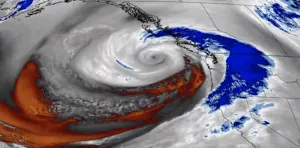
Public health on the agenda at COP26 – as climate change’s impacts worsen
More countries are getting serious about planning for climate change’s effects on their healthcare systems, but many say they’ll need help covering the costs.
Fossil fuels and finance have been getting a lot of airtime during this year’s COP26 climate change conference in Glasgow — but, more and more, the crisis is being viewed through the lens of public health, both in its impacts on people, and its impacts on healthcare infrastructure.
On Tuesday, some 50 countries at COP26 announced plans to make their healthcare systems more climate-resilient, and many of them also committed to curbing those systems’ emissions.
“The future of health must be built on health systems that are resilient to the impacts of epidemics, pandemics and other emergencies, but also to the impacts of climate change, including extreme weather events and the increasing burden of various diseases related to air pollution and our warming planet,” Dr. Tedros Adhanom Ghebreyesus, the World Health Organization’s Director-General, said in a release from the organization.
But while there’s a more conscious effort to tackle the public health aspect of the crisis, a worrisome wrinkle is emerging in that conversation: more countries have said they lack the necessary funds to fully implement national health care and climate change plans.
That’s the finding of the 2021 WHO Health and Climate Change Global Survey Report, released Monday during a side conference during COP26 focussed on public health. Specifically, 70 per cent of countries surveyed said lack of funds is a barrier to putting a climate change health plan in place, a big jump from 2019, when 56 per cent said so.
On the flip side: the survey shows large majorities of countries surveyed are becoming more organized about planning for climate change health impacts. Around 85 per cent of countries now have a person or department within their health ministries specifically devoted to health and climate change, while 94 per cent of countries have built health considerations into their plans to address climate change under the Paris Agreement.
The report also notes two thirds of countries have either conducted a climate change and health vulnerability assessment, or are currently doing so, including Canada — though the report does note that Canada does not yet have a national health and climate plan in place.
WATCH BELOW: B.C.'S EXTREME HEAT CAUSED A STAGGERING NUMBER OF DEATHS, NEW CORONER'S REPORT SAYS
MORE ALARM BELLS RINGING ON PUBLIC HEALTH
In recent years, more and more studies have emerged on climate change’s impact on public health — which is only expected to get worse as the planet warms.
In Canada, as in most other countries, it’s expected to worsen air quality and disease vector spread, to say nothing of the effects of more frequent and more intense extreme heat events. Smoke from wildfires, which are also expected to become more numerous in the coming decades, is also expected to take its toll over the coming century.
One of the latest major studies on the crisis comes from British medical journal The Lancet, which found that worsening heatwaves and wildfires, drought, and other escalating climate change impacts have been harming people’s health in multiple countries over the past couple of decades — and Canada’s share of the numbers is alarming.
Perhaps no surprise to people in B.C., who saw catastrophic damage from fires this summer, on any given day, the number of Canadians exposed to “very high” climate-related wildfire risk is up by 160 per cent compared to two decades ago.
Heatwaves, too, have continued to get longer and hotter, hitting people over 65 hardest. The Lancet report stated people in that age group, collectively, experienced 2 million more days of heatwave exposure each year from 2016–2020.
Heatwaves have hit the economy as well. In the same report, the Lancet report also stated almost 22 million hours of potential labour was lost due to heat last year, one and a half times more than the 1990–1994 average.
WATCH BELOW: WHAT WE ARE LEARNING ABOUT THE LONG-TERM IMPACTS OF WILDFIRE SMOKE
The report comes with a number of policy recommendations for Canada, chief among them the creation of a new national body that can work to develop a national climate adaptation strategy, to overcome what it calls “silos” of individual action by government actors.
That would include funding cost-benefit analyses for climate change policies that take into account public impacts — and making sure to publicize those studies to the public.
In Canada, Yellowknife ER physician Dr. Courtney Howard, who authored policy briefs for The Lancet from 2017–2019, said governments and other actors need to use evidence-based information to help people — including oil and gas workers — prepare for a future beyond fossil fuels, as more and more governments commit to winding them down or phasing them out in the drive toward net zero.
“It will take time to put forward a more realistic view. There will be pushback, but that is simply a human reaction to distressing news. People don't like being told they have cancer either,” Howard said. “But levelling with people and telling them the truth is the only ethical approach, and in the long run gives them the information they need to live the best lives possible.”
Thumbnail credit: David Bradley.











